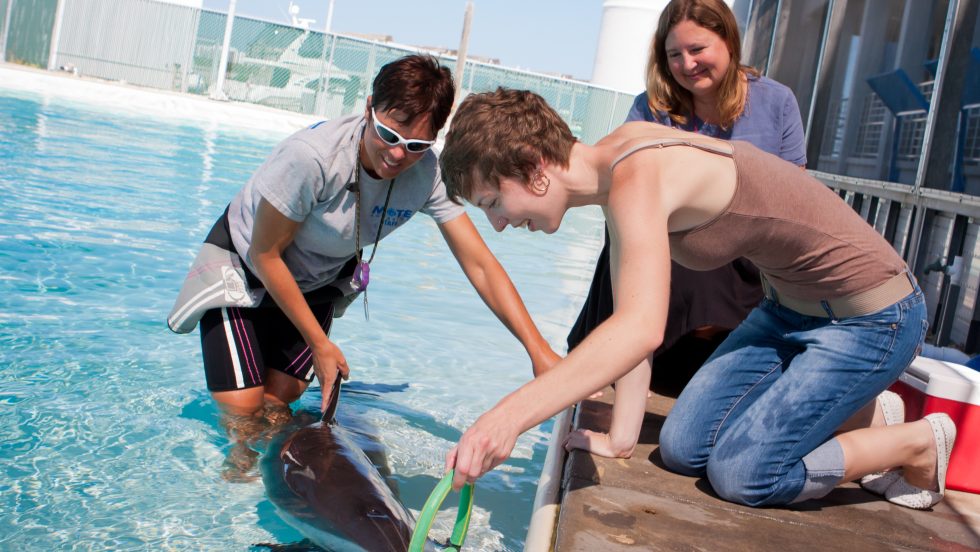U.S. Department of Defense Grants Research Award to New College of Florida and Partnering Institutions for In-Depth Mammal Study

Twelve senior researchers will work on seven interrelated projects exploring how dolphins, humans and seals learn to recognize and process auditory objects in cluttered acoustic scenes. The initiative was one of only 28 projects selected from a pool of 340 proposals to the MURI program for Fiscal Year 2022.
The Office of Naval Research will oversee the undertaking, with Carnegie Mellon University serving as the lead institution in collaboration with New College, the University of Massachusetts Dartmouth, the University of Washington, the University of Michigan and Woods Hole Oceanographic Institution.
If fully funded as proposed, the project will run for five years, with an award to New College of $576,960, according to Justin Miller, Ed.D., the director of the Office of Research Programs and Services at New College. This will fund the research of New College Director of Environmental Studies Heidi Harley, Ph.D., and three of her student assistants/interns per year. It will also cover research travel to partner aquariums, as well as supplies and consulting fees.
“One of my favorite aspects of this award is the people with whom I get to collaborate. Thorny problems require multidisciplinary teams of people with two characteristics: expertise and openness to others’ ideas and perspectives,” Harley said. “This grant’s team is rich in both: experts in sound (bioacoustics, electrical engineers, applied physics), neuroscience (brain investigatory technology like EEG and fNIRS), modeling (more engineers), biology and psychology.”
Harley and the team will measure neural and other physiological markers during behavioral tasks in dolphins, humans and seals. For example, they will test humans and seals under different cardiovascular stresses (like those experienced by divers) to measure the influences of physiological state on perception, action and neural responses—collecting information that could be invaluable for military applications and beyond.
“Because my job is to work with folks to train dolphins who can teach us how they learn to recognize objects using echolocation through their information-seeking behaviors (clicks, the echoes they receive, their head movements, how they swim and approach the objects, etc.), I need lots of local help, and that’s where New College students come in,” Harley said. “I’ll work with some students on campus to manage the data as it is generated, as well as interns who will help us at the facilities where we collect data.”
New College biopsychology thesis student Hannah Nations is the first of those research interns (a pre-grant intern, in this case), and she has been working with the staff and dolphins at the Clearwater Marine Aquarium (CMA) to prepare Harley and the team for the coming projects covered by the MURI award. Nations has been Harley’s advisee since her first year at New College, as well as a teaching assistant for Harley’s “Introduction to Animal Wellbeing” course.
“I’m working with some of the CMA’s dolphin trainers to prepare one of their dolphins (Nicholas) for research trials. I think the most rewarding aspect of this, for me, has been all the invaluable experience. I get to watch every day as people train dolphins, otters and pelicans,” Nations said. “The fact that Dr. Harley specifically asked me to do this internship is such an honor. I think that conducting in-depth research as an undergraduate at New College has prepared me for a future career in the field of animal behavior.”
New College also offers students the opportunity to work with multiple community partners related to animal research, including the Lemur Conservation Foundation and the Chicago Zoological Society’s Sarasota Dolphin Research Program. The interinstitutional MURI award is another example of New College’s collaborative approach to research, and it is one of its most expansive.
A total of $195 million has been allocated for the 2022 MURI awards by the DoD, and these grants will go to 63 U.S. academic institutions for five years each (subject to satisfactory research progress and the availability of funds). Since 1985, the MURI program has supported teams of investigators to help address the DoD’s specific problem sets—leading to technological advances that have made significant impacts on military capabilities and the commercial sector.
“By supporting teams whose members have diverse sets of expertise, the MURI program acknowledges that the complexities of modern science and engineering challenges often intersect more than one discipline and require creative and diverse approaches to tackle these problems,” said Dr. Bindu Nair, the director of the Basic Research Office in the Office of the Undersecretary of Defense for Research and Engineering. “It is a program that signifies a legacy of scientific impact and remains a cornerstone of the DoD’s basic research portfolio.”
Abby Weingarten is the senior editor in the Office of Communications & Marketing.
